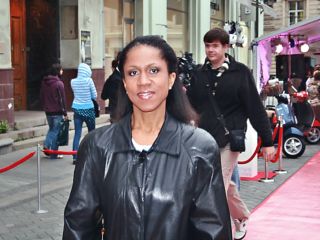Washington: As a young girl growing up in the Soviet Union, New York-based filmmaker Yelena Demikovsky was captivated by “The Circus”, a 1936 Stalin-era musical about a white American circus performer and her illegitimate black son who find racial harmony and acceptance in the Soviet Union.
“It’s a Soviet propaganda movie, but it’s beautiful, with a lot of music, and absolutely perfectly done,” Demikovsky said. “A perfect 1930s Hollywood-style film.”
Decades later and a continent away, Demikovsky has joined Sam Pollard, a longtime collaborator of American film director Spike Lee, to produce a documentary on real African-Americans who fled segregation laws and discrimination in the US in the early 20th century to seek a better life in the Soviet Union.

Demikovsky has been collecting materials and interviews for the documentary tentatively titled “Black Russians – The Red Experience”, and has travelled to Moscow to speak with the decedents of black American migrants to the Soviet Union.
Demikovsky, granddaughter of a Bolshevik revolutionary, hopes to finish the film this year.
“Those black Americans went to Russia not only during the era of the Great Depression and segregation in America, but also during the Harlem Renaissance when they, being educated and brave, felt that they deserved something better than they would have here,” said Demikovsky.
“They also had nothing to lose at that time,” she said.
Demikovsky’s subjects include Wayland Rudd Jr., a Moscow-based singer and the son of an African-American actor who moved to the Soviet Union in the 1930s, and Russian TV personality Yelena Khanga, granddaughter of a Mississippi cotton farmer and a Polish-Jewish American woman who relocated to then Soviet Uzbekistan, the cradle of the country’s cotton industry, around the same time.
“The Soviet Union was buying special machinery to process cotton, and he taught Uzbek specialists how to process cotton using machinery,” Khanga, who hosted Russia’s first sex-themed TV talk show, says of her grandfather in Demikovsky’s film.
There was an ominous duplicity to the reception of African-American visitors to Stalin’s Soviet Union, such as literary giants Langston Hughes and Claude McKay, Yale literature professor Vladimir Alexandrov tells Demikovsky in an interview for the documentary.
“They could be very welcoming to Claude McKay at the same time that they opened the Solovki concentration camp in the north, and are killing off and driving out members of social classes that they didn’t like,” says Alexandrov, author of “The Black Russian”.
“The Black Russian” is a biography of Frederick Thomas, a black American who came to imperial Russia at the end of the 19th century.
Demikovsky’s grandfather, David Demikhovsky, a senior regional party official, was shot and killed as an enemy of the people in 1938. The filmmaker says she plans to dedicate the documentary to him.
Pollard, who co-produced Lee’s 1997 Oscar-nominated documentary “4 Little Girls”, said he joined the project as a producer because he was fascinated by the material.
“I knew about Langston Hughes visiting Russian in the 1930s but I didn’t know about the people that Yelena has focused on who stayed and lived very productive lives,” said Pollard, who has worked as an editor on other Lee films, including “Clockers”, “Mo Better Blues” and “Jungle Fever”.
One interview subject Demikovsky is still trying to track down is poet James Patterson, who played the young black boy in “The Circus”, the Soviet musical that so enthralled Demikovsky in her youth.
The finale of the 1936 movie shows the boy being passed around and serenaded by representatives of the Soviet Union’s many nationalities in their respective native languages.
Patterson’s father, Lloyd Patterson, travelled to the Soviet Union with Hughes and other black Americans for a film project called “Black and White” that was to be used as a propaganda film portraying the evils of racism in the US.
The film project fell through, but Patterson remained in the Soviet Union and married Soviet painter and costume designer Vera Aralova. The couple had three children, including James, before Lloyd Patterson received a fatal contusion in 1941 during a German bombing of Moscow, where he worked as a radio operator early in World War II.
James Patterson went on to join the Soviet Navy, become a Soviet poet and join the Union of Soviet Writers before eventually migrating to the US and settling in the Washington area after the fall of the Soviet Union.
Patterson’s exact whereabouts and the current state of his health are unclear, but Demikovsky says she is attempting to locate and interview him.
Patterson’s story and others in Demikovsky’s film have a good chance of resonating with an American audience that largely knows nothing about this aspect of the African-American experience, Pollard said.
“People know about Liberia, but how many people know that they went to the Soviet Union not only to visit, but to stay and raise families?” he said.
“I’m 62, and I didn’t really know that story.”
by Carl Schreck
–IANS/RIA Novosti
The opinions, beliefs and viewpoints expressed by authors, news service providers on this page do not necessarily reflect the opinions, beliefs and viewpoints of Hill Post. Any views or opinions are not intended to malign any religion, ethnic group, club, organization, company, or individual.
Hill Post makes no representations as to the accuracy or completeness of any information on this site page.




I have some information that Ms Demikovsky might be able to use for her “Black Russians” project. Would it be possible to get word to her to have he contact me?
Thank you,
Howard Kaplan